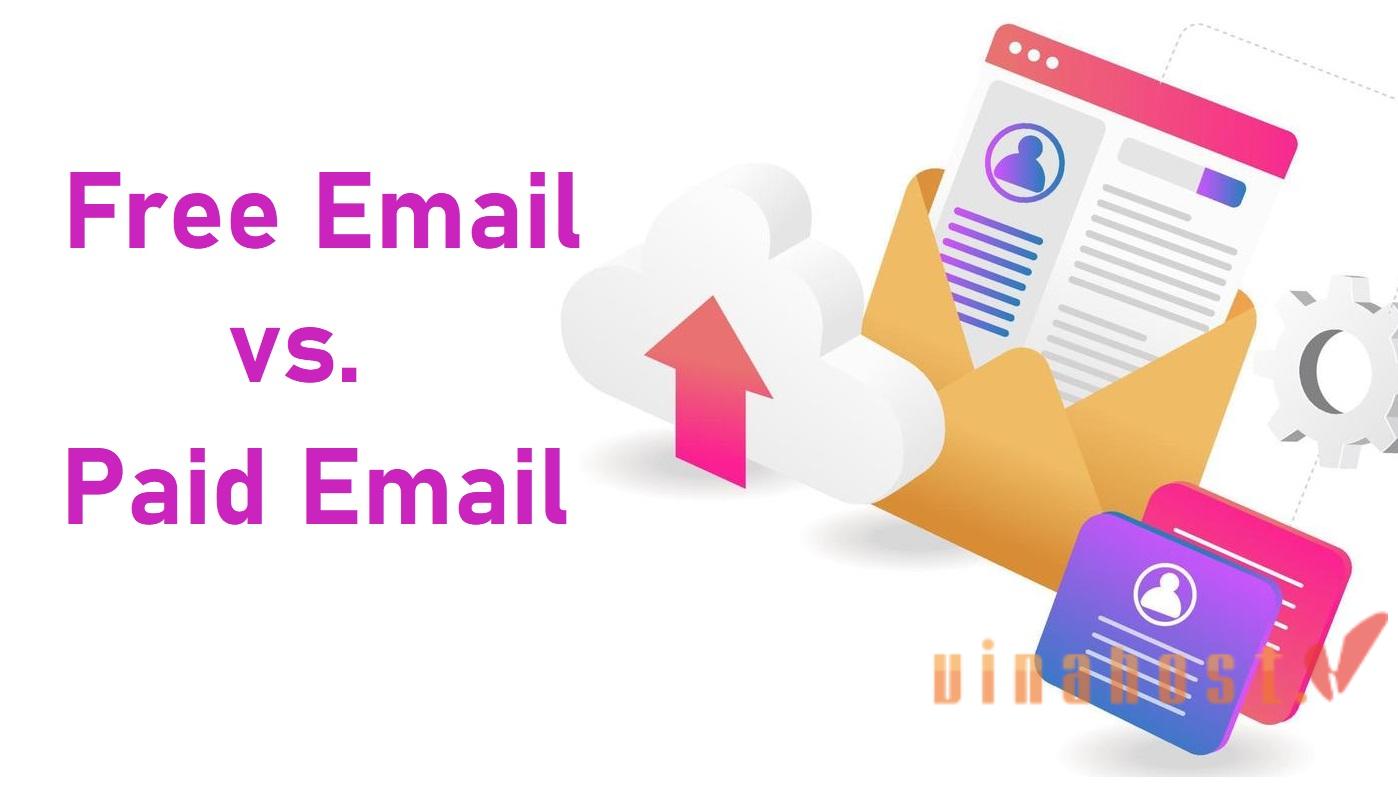Nowadays, email has become an indispensable communication tool for both individuals and businesses. Email hosting is a service that provides you with a dedicated email address and server space to manage your emails. It offers a professional and reliable way to communicate and collaborate online. This article will explore what is email hosting, how it works, and the various benefits it provides. VinaHost will also discuss the different types of email hosting available and how to choose the right provider for your needs.
1. What is Email Hosting?
Email hosting is a service that allows businesses and individuals to send, receive, and store emails on a server provided by a hosting company.
Unlike free email services like Gmail or Yahoo, email hosting is typically associated with a custom domain name (e.x., support@vinahost.vn), offering a more professional appearance and greater control over your email communications.

2. How Does Email Hosting Work?
Email hosting works by providing users with a dedicated server or space on a server where their emails are stored and managed:
- Domain name: First, you need a registered domain name that will be used for your email addresses. This domain is often linked to your website, ensuring that your email addresses align with your brand or business identity.
- Email server: The hosting provider sets up an email server that will handle the sending, receiving, and storing of your emails. The server is configured to support your custom domain, allowing you to create personalized email addresses (e.x., info@vinahost.vn).
- Email clients and access: You can access your email through various email clients, such as Microsoft Outlook, Apple Mail, or webmail interfaces provided by the hosting service. These clients connect to the email server using standard protocols like IMAP, POP3, or SMTP, allowing you to manage your inbox, compose new messages, and organize your communications.
- Security and management: Email hosting services typically include security features like spam filtering, virus protection, and encryption to safeguard your communications. Depending on the hosting plan, you may also have access to additional features like storage space management, email forwarding, auto-responders, and collaborative tools like calendars and contacts.
- Support and maintenance: The hosting provider is responsible for maintaining the email server, ensuring it runs smoothly, and providing technical support. This includes regular backups, software updates, and addressing any issues that may arise, giving you peace of mind and allowing you to focus on your business.
Also read: What is DDNS? | How Does Dynamic DNS Work?
3. Features of Email Hosting
The features of email hosting are fundamental to creating a robust and efficient communication system for businesses and individuals alike.
These features combine to create a comprehensive email hosting solution that addresses the needs of modern businesses, from security and reliability to flexibility and scalability. Each feature plays a crucial role in ensuring that email communication is efficient, secure, and professional.
Here are main features of email hosting:
4. Benefits of Email Hosting

Now that you understand what features of email hosting are, let’s delve into an important aspect: Benefits of it.
The benefits of email hosting are essential for businesses and professionals who rely on consistent, secure, and professional communication. These benefits collectively enhance business efficiency, security, and professionalism, making email hosting a valuable investment for most organizations.
Here’s why these benefits stand out:
- Professionalism: Custom domain emails are a simple yet powerful way to boost brand credibility. It’s an immediate indicator to clients and partners that your business is established and trustworthy.
- Security: In today’s environment, email security is non-negotiable. The advanced protection offered by email hosting services shields sensitive data from increasingly sophisticated cyber threats, which is crucial for maintaining the trust of your clients.
- Reliability: With the importance of uninterrupted communication, the reliability that email hosting services provide is invaluable. Minimal downtime ensures that your business operations run smoothly without costly delays or missed opportunities.
- Customizability: The ability to tailor your email setup to your specific needs is a huge advantage. Whether it’s creating specialized addresses for different departments or setting up detailed forwarding rules, this flexibility supports efficient communication workflows.
- Enhanced collaboration: Integrated collaboration tools streamline team communication, which can be a significant productivity booster. These features help keep your team on the same page, reducing the need for additional third-party tools.
- Support and maintenance: Email hosting providers handle server maintenance, software updates, and technical support, freeing you from the burden of managing these aspects yourself.
- Scalability: As businesses grow, their needs evolve. The scalability of email hosting services ensures that your communication infrastructure can expand without the need for disruptive changes or costly overhauls.
- Access anywhere: The flexibility to access emails from anywhere supports modern work environments where remote work and mobility are increasingly common. This ensures that business operations can continue seamlessly, regardless of location.
- Cost-effective: By outsourcing email hosting, businesses can access advanced features without the overhead costs associated with managing in-house servers. This allows for better resource allocation and focuses on core business activities.
Also read: How to Send an Effective Email Campaign?
5. What is Email Hosting Used For?
Email hosting is used for several key purposes, particularly by businesses and professionals who require reliable, secure, and professional email communication. Here are some common use cases:
- Business communication: Businesses use email hosting to create professional email addresses for their employees and clients, facilitating communication and collaboration.
- Personal email: Individuals use email hosting to set up personal email accounts for communication with friends, family, and colleagues.
- Online services: Many online services require an email address for account creation and verification.
- Website contact forms: Email hosting is essential for handling contact forms on websites, allowing visitors to send inquiries or feedback.
- E-commerce: Businesses use email hosting to send order confirmations, shipping updates, and marketing communications to customers.
- Marketing and newsletters: Email marketing campaigns and newsletters can be sent using email hosting services.
Also read: What is the difference between VPS and Shared Hosting
6. Who Hosts Email?

Email hosting can be provided by various types of organizations, ranging from specialized email hosting companies to large tech companies offering comprehensive hosting solutions.
Each of these options offers different levels of control, security, and customization, allowing businesses and individuals to choose the best solution based on their specific needs.
Here’s who typically hosts email:
- Specialized email hosting providers: These companies focus exclusively on providing email hosting services, offering features like custom domain emails, advanced security, and reliable support. Examples include Zoho Mail and FastMail.
- Web hosting companies: Many web hosting companies offer email hosting as part of their hosting packages, allowing businesses to host their websites and emails under one provider. Examples include Bluehost, SiteGround, and HostGator.
- Cloud service providers: Major cloud service providers like Google Cloud, Microsoft Azure, and Amazon Web Services (AWS) offer email hosting services as part of their broader cloud offerings. These platforms often provide advanced features, scalability, and integration with other cloud services.
- Internet Service Providers (ISPs): Some ISPs offer email hosting services as part of their internet service packages. While these may be more basic, they can still provide essential email functionality for smaller businesses or personal use.
- Managed IT service providers: Managed service providers (MSPs) often include email hosting as part of their comprehensive IT management services, catering to businesses that prefer outsourced IT solutions.
- Corporate IT departments: Large organizations may choose to host their own email servers in-house, managed by their IT departments. This approach provides complete control over the email system but requires significant technical expertise and resources.
- Free email dervice providers: While not traditionally classified as email hosting, free services like Gmail and Outlook.com offer basic email accounts that individuals and small businesses can use. However, these typically don’t include custom domain features or advanced security options.
Also read: What is a Domain Registrar? | Function of a Domain Registrar
7. Do I Need Web Hosting for Email?
Whether you need web hosting for email depends on your specific needs. For basic email services and convenience, web hosting with email features may suffice. For more advanced email requirements, a dedicated email hosting provider could be more appropriate.
When you need web hosting for email:
- Integrated email and website hosting: Many web hosting providers offer email hosting as part of their services. If you want a single provider for both your website and email, choosing a web hosting plan that includes email features can be convenient and cost-effective.
- Cost efficiency: For small businesses or personal projects, using the same provider for both web and email hosting can be more economical. Some web hosting plans include a certain number of email accounts at no additional cost.
- Simplicity: Having both web and email hosting with one provider simplifies management. You can handle website and email settings through a single control panel, making administration easier.
When you don’t need web hosting for email:
- Specialized email needs: If you require advanced email features, high security, or dedicated support, you might benefit more from a specialized email hosting provider. These services often offer more robust email features than typical web hosting plans.
- High email volume: For businesses with high email volumes or complex email needs, dedicated email hosting services can provide better performance, scalability, and reliability compared to standard web hosting plans.
- Independent email management: If you prefer to manage your email separately from your web hosting or have specific requirements that are not met by your web hosting provider, a dedicated email hosting provider might be the better choice.
Services like VinaHost, Google Workspace, Microsoft 365, or Zoho Mail offer dedicated email solutions without the need for web hosting. These can be ideal if you’re looking for advanced email features and high reliability.
8. Choosing an Email Hosting Provider
8.1. Pricing and Plans
Firstly, you need to evaluate the pricing structure of different email hosting providers to ensure it fits within your budget. Then, look for transparent pricing models that outline what’s included in each plan.
You also need to consider whether the provider offers scalable plans that can grow with your needs, and compare the cost of additional features or users. Some providers offer free plans with basic features, while others provide premium plans with advanced functionalities.
8.2. Storage Capacity
You should assess the storage capacity provided by each email hosting plan and ensure that the provider offers enough space for your needs, including emails, attachments, and archived messages.
It’s important for you to check if the storage capacity is scalable or if you can easily upgrade to a higher plan if needed. Adequate storage is crucial for preventing issues like mailbox overflows and maintaining smooth email operations.
8.3. Security Features
Review the security measures offered by the email hosting provider is necessary. You need to look for features such as spam and virus protection, encryption, and secure access protocols (e.x., SSL/TLS) and make sure the provider has robust measures in place to protect against data breaches, phishing attacks, and other cyber threats. Compliance with industry standards and regulations can also be a critical factor for security-sensitive applications.
8.4. Customer Support
Additionally, you should evaluate the quality and availability of customer support the choose a provider that offers reliable support through multiple channels, such as phone, email, and live chat.
Then, check if support is available 24/7 and whether it includes access to knowledgeable technicians who can resolve issues promptly. Good customer support is essential for addressing any technical problems or questions that may arise with your email hosting service.
Also read: What is an EPP Code? | Why do you need an EPP Code?
9. Free vs Paid Email Hosting

This table provides a snapshot of the key differences between free and paid email hosting, helping you understand the trade-offs and benefits of each option:
| Aspect | Free Email Hosting | Paid Email Hosting |
|---|---|---|
| Cost | Free or minimal cost | Subscription-based, with varying costs |
| Storage Capacity | Limited storage; often capped | Greater storage capacity; scalable options |
| Features | Basic features; limited customization | Advanced features; extensive customization |
| Security | Basic security; may include ads | Advanced security; robust protection and encryption |
| Support | Limited or no customer support | 24/7 customer support; dedicated assistance |
| Reliability | May experience downtime or less reliability | High reliability with minimal downtime |
| Professionalism | Generic email addresses; may display ads | Custom domain emails; ad-free experience |
| Collaboration Tools | Often lacks advanced collaboration features | Includes tools like shared calendars and contacts |
| Integration | Limited integration with other services | Comprehensive integration with business tools |
9.1. When to Choose Free Email Hosting
Free email hosting can be a suitable option for individuals or small businesses with limited email needs and a tight budget:
Personal or small-scale use:
- If you have a limited number of email accounts and low email volume, free mail hosting can suffice. It’s often suitable for personal projects or small-scale personal use.
- For individuals or small startups with tight budgets, free mail hosting offers a cost-effective way to manage email communication without incurring additional expenses.
Testing and development:
- When experimenting with new email setups or testing different features, free email hosting provides a risk-free environment to assess functionalities without financial commitment.
- Developers or businesses in the early stages of creating a website or app might use free email hosting to prototype and test their systems before committing to a paid plan.
Basic needs:
- If your email needs are basic—such as sending and receiving emails without requiring advanced features – free email hosting can meet those needs without extra costs.
- If you don’t need a custom domain and are fine with generic email addresses (e.x., name@gmail.com), free services can be a practical choice.
Temporary projects:
- For temporary projects, events, or short-term campaigns where professional-grade features aren’t essential, free mail hosting can be a convenient option.
- If you’re exploring different email hosting providers or planning to switch, using free email hosting can serve as a temporary solution while you evaluate other options.
Learning and practice: If you’re learning about email hosting, management, or related technologies, free services can offer practical experience without the financial implications of paid services.
9.2. When to Choose Paid Email Hosting
Paid email hosting is generally recommended for individuals and businesses with higher email volume, advanced requirements, or a need for enhanced security and reliability:
10. What is the Difference Between Web Hosting and Email Hosting?

Also read: What is Shared Hosting? | How Does Shared Hosting Work?
11. FAQs
11.1. How much does email hosting cost?
Generally, you can expect to pay anywhere from a few dollars to several dollars per month for a basic email hosting plan. However, prices can go up significantly for plans with more advanced features, larger storage capacities, or increased email volume.
Basic email hosting:
- Cost: $1 to $5 per user per month
- Features: Basic email accounts, moderate storage, and essential security features. Often suitable for small businesses or personal use.
Standard email hosting:
- Cost: $5 to $15 per user per month
- Features: Includes custom domain email, increased storage, advanced security, spam filtering, and basic collaboration tools. Common for small to medium-sized businesses.
Advanced email hosting:
- Cost: $15 to $30 per user per month
- Features: Includes extensive storage, advanced security features, comprehensive collaboration tools, integrated productivity suites, and premium support. Usuallt used by larger companies, organizations with complex demands.
Enterprise email hosting:
- Cost: $30+ per user per month
- Features: High storage limits, extensive security measures, customized solutions, high-level compliance features, and 24/7 premium support. Designed for large enterprises with significant email and collaboration requirements.
11.2. Is email hosting difficult to set up?
Setting up email hosting can be relatively straightforward, especially if you’re using a user-friendly web hosting control panel. However, some technical knowledge might be required, particularly if you’re configuring MX records or using more advanced features.
Here’s a general guideline to set up mail hosting:
- Choose an email hosting provider: Select a provider that meets your needs in terms of features, pricing, and reliability.
- Set up your domain name: If you don’t already have one, you’ll need to register a domain name.
- Configure MX records: Update your domain name’s MX records to point to the email hosting provider’s servers.
- Create email accounts: Set up email accounts using your domain name.
- Configure your email client: Configure your preferred email client (e.x., Outlook, Gmail, Thunderbird) to access your new email accounts.
If you’re unsure about any of these steps, contact your providers to get support resources, such as tutorials, documentation, or customer service.
11.3. Do I need email hosting if I already have a free email account?
If you already have a free email account, you might still need mail hosting if you require a custom domain, advanced features, or enhanced security.
Free email accounts typically use generic domains and may lack advanced functionalities like larger storage capacities, shared calendars, and robust spam protection.
For businesses or organizations needing scalable solutions, dedicated support, and integration with other tools, email hosting provides the professional edge and reliability that free accounts may not offer.
However, for basic personal use or minimal email needs, a free email account might suffice, especially if budget constraints are your concern.
11.4. What are some popular email hosting providers?
Google Workspace (formerly G Suite): Google Workspace is a comprehensive suite of productivity and collaboration tools that includes custom domain email through Gmail, along with other Google services such as Google Docs, Google Drive, Google Sheets, Google Calender and Google Meet.
- Custom domain tmail: Professional email addresses with your own domain.
- Advanced security: Two-factor authentication, phishing protection, and secure email protocols.
- Collaboration tools: Integrated with Google’s suite of tools for document creation, file storage, and video conferencing.
- Admin tontrol: Extensive administrative features for managing users, security, and compliance.
Microsoft 365: Microsoft 365 offers a range of productivity tools, including custom domain email via Outlook, integrated with Microsoft Office applications like Word, Excel, and PowerPoint, and collaborative tools such as Microsoft Teams.
- Custom domain email: Professional email addresses with your domain, accessed through Outlook.
- Advanced security: Includes threat protection, encryption, and compliance features.
- Collaboration tools: Seamless integration with Office apps and Microsoft Teams for communication and collaboration.
- Admin control: Comprehensive admin tools for managing user accounts, security policies, and compliance.
Zoho Mail: Zoho Mail provides a robust email hosting solution with a focus on privacy and ad-free experience. It is part of the Zoho suite of applications, which includes CRM, project management, and other business tools.
- Custom domain email: Professional email addresses with your domain.
- Ad-Free: No advertisements in the user interface.
- Security: Includes strong security features like encryption and spam filtering.
- Collaboration tools: Offers integrated features like calendar, contacts, and task management.
ProtonMail: ProtonMail is a privacy-focused email service known for its end-to-end encryption. It offers secure email hosting with a focus on protecting user privacy and data.
- End-to-end encryption: Ensures that only you and your recipient can read the emails.
- Custom domains: Available with paid plans for businesses.
- Privacy focused: Does not track or sell user data; based in Switzerland with strong privacy laws.
- Security: Includes built-in protection against phishing and spam.
VinaHost: VinaHost is a hosting provider based in Vietnam that offers email hosting as part of its broader hosting solutions. It provides custom domain email with reliable support and security features.

Email Hosting at VinaHost is an email service running on a dedicated server system with high security. Email hosting enhances the reliability of email and ensures that emails are always sent to inbox.
- Own email domain name (Ex: mainguyen@vinahost.vn)
- Strong IP reputation – high inbox rates
- Monitoring system helps limit Spam affecting IP reputation
- Smart, flexible SMTP Transaction Route system (Smart Route)
- Set up Email Domain Authentication
- Free IPv6 – Free SSL certificate
- Integrated on Email Client (MUA) on all platforms and devices: Outlook, Thunderbird GMail, BlueMail, Anroid mail, IOS on PC/Mobile
- Start at 2.00 USD/Month
VINAHOST EMAIL HOSTING PRICING
| Service pack | Email Hosting E-One | Email Hosting E-Two | Email Hosting E-Three | Email Hosting E-Four | Email Hosting E-Five | Email Hosting E-Six | Premium Email |
|---|---|---|---|---|---|---|---|
| Price | 1.70 USD/Month | 3.19 USD/Month | 6.38 USD/Month | 11.48 USD/Month | 17.85 USD/Month | 24.23 USD/Month | From 26.00 USD/Month |
| Disk Space | 5 GB | 10 GB | 25 GB | 60 GB | 120 GB | 250 GB | From 150GB |
| Email Account | 5 | 10 | 20 | 50 | 100 | 200 | Unlimited |
| Email limit/domain per day | 250 | 500 | 1000 | 2500 | 5000 | 10000 | Unlimited |
| Maximum Number Of Recipients In 1 Email | 30 | 30 | 30 | 30 | 30 | 30 | 30 |
| Data Transfer | Unlimited | Unlimited | Unlimited | Unlimited | Unlimited | Unlimited | Unlimited |
| Free SSL | |||||||
| Backup | |||||||
Additionally, VinaHost also provides other email services as follows:
- Microsoft 365 – Easily share files, co-author in real time
- Google Workspace – How teams of all sizes connect, create, and collaborate
- Email Server – Dedicated Mail Server – Dedicated IP – Full control
- Email Marketing – Launch your bulk email campaign in 3 mins
11.5. Is email hosting secure?
Email hosting security is a complex issue, and the level of security can vary depending on the provider and the measures you take to protect your account.
While reputable mail hosting providers implement various security measures, there are always potential risks. Some of the security challenges associated with email hosting include:
- Phishing: Phishing attacks attempt to trick users into revealing sensitive information, such as passwords or credit card details.
- Spam: Unwanted emails, or spam, can clutter your inbox and potentially contain malicious content.
- Malware: Viruses and other malicious software can infect your email accounts and compromise your data.
- Data breaches: Email hosting providers may experience data breaches, where unauthorized individuals gain access to user data.
To enhance email security, consider the following measures:
- Choose a reputable provider: Select an email hosting provider with a strong reputation for security and reliability.
- Use strong passwords: Create complex, unique passwords for your email accounts and avoid sharing them with others.
- Enable two-factor authentication: This adds an extra layer of security by requiring a second form of verification, such as a code sent to your phone.
- Be cautious of suspicious emails: Be wary of emails from unknown senders or those containing unusual links or attachments.
- Keep software updated: Ensure that your email client and any associated software are up-to-date with the latest security patches.
- Regularly review your account activity: Monitor your email account for any unusual or suspicious activity.
While no email hosting service can guarantee complete security, by taking these precautions, you can significantly reduce the risk of email-related threats.
12. Conclusion
We hope this article helps you understand what is email hosting. We can see that email hosting plays a vital role in ensuring that your email communication is professional, secure, and efficient.
By offering custom domain email addresses, email hosting enhances your brand’s credibility and allows for greater control over your email environment compared to free email services. Understanding how mail hosting works and the benefits it provides can help you make an informed decision that aligns with your needs.
Choosing the right mail hosting provider can significantly impact your communication experience, whether for personal use or business purposes. If you are seeking email service providers in Vietnam, contact VinaHost for competitive email hosting prices.
As a professional email service provider in Vietnam, we offer a pricing strategy designed to provide customers with the best service at the lowest cost. Our pricing is flexible and tailored to meet the needs of various users. Additionally, we offer a 30-day no-questions-asked refund policy for all customers.
We invite you to sign up for our free trial email hosting plan to experience our features and determine if they fit your needs. If our current email hosting plans do not meet your requirements, please let us know so we can make improvements in future versions. Don’t hesitate to contact us now to try our service:
- Email: support@vinahost.vn
- Hotline: 1900 6046
- Livechat: https://livechat.vinahost.vn/
Find out more articles at our Blog!
What is NVMe VPS? | The Difference between NVMe VPS vs SSD VPS
What is a Domain Extension? | How to Choose a Domain Extension
What is Minecraft VPS Hosting? | Top 6 Minecraft VPS Hosting Providers




















